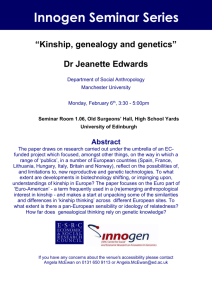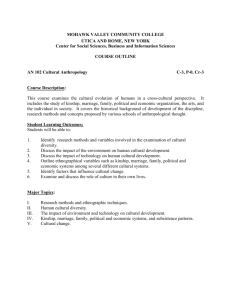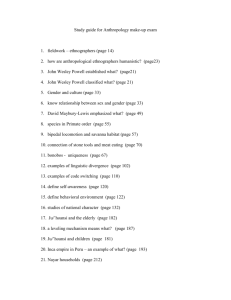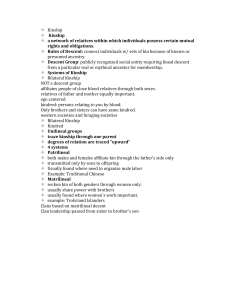Social Theory
advertisement
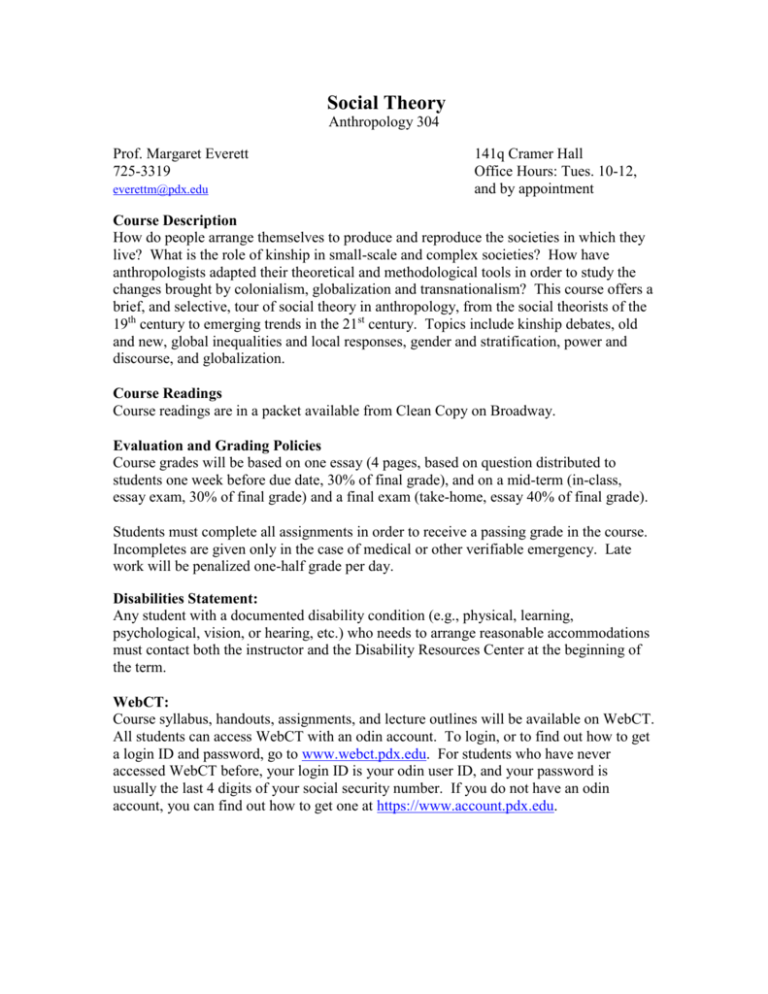
Social Theory Anthropology 304 Prof. Margaret Everett 725-3319 everettm@pdx.edu 141q Cramer Hall Office Hours: Tues. 10-12, and by appointment Course Description How do people arrange themselves to produce and reproduce the societies in which they live? What is the role of kinship in small-scale and complex societies? How have anthropologists adapted their theoretical and methodological tools in order to study the changes brought by colonialism, globalization and transnationalism? This course offers a brief, and selective, tour of social theory in anthropology, from the social theorists of the 19th century to emerging trends in the 21st century. Topics include kinship debates, old and new, global inequalities and local responses, gender and stratification, power and discourse, and globalization. Course Readings Course readings are in a packet available from Clean Copy on Broadway. Evaluation and Grading Policies Course grades will be based on one essay (4 pages, based on question distributed to students one week before due date, 30% of final grade), and on a mid-term (in-class, essay exam, 30% of final grade) and a final exam (take-home, essay 40% of final grade). Students must complete all assignments in order to receive a passing grade in the course. Incompletes are given only in the case of medical or other verifiable emergency. Late work will be penalized one-half grade per day. Disabilities Statement: Any student with a documented disability condition (e.g., physical, learning, psychological, vision, or hearing, etc.) who needs to arrange reasonable accommodations must contact both the instructor and the Disability Resources Center at the beginning of the term. WebCT: Course syllabus, handouts, assignments, and lecture outlines will be available on WebCT. All students can access WebCT with an odin account. To login, or to find out how to get a login ID and password, go to www.webct.pdx.edu. For students who have never accessed WebCT before, your login ID is your odin user ID, and your password is usually the last 4 digits of your social security number. If you do not have an odin account, you can find out how to get one at https://www.account.pdx.edu. Schedule Week 1: In the Beginning…Marx, Weber and Durkheim 9/26 Introduction 9/28 Marx Read: Karl Marx and Friedrich Engels, “Feuerbach: Opposition of the Materialist and Idealist Outlook” Video: Marx for Beginners 9/30 Weber Read: Max Weber, “Class, Status, Party” Week 2: British Structural Functionalism 10/3 Durkheim Read: Emile Durkheim, “The Sociological Method” and “The Division of Labor in Society” 10/5 Radcliffe-Brown Read: A.R. Radcliffe-Brown, “The Methods of Ethnology and Social Anthropology” and “On Rules of Descent and Interkin Behavior” 10/7 Malinowski Read: B. Malinowski, “Kinship” Video: Off the Veranda Week 3: Alliance and Descent 10/10 Reciprocity Read: Marcel Mauss, Excerpts from The Gift 10/12 Segmentary Lineage Systems Read: Marshall Sahlins, “The Segmentary Lineage: An Organization of Predatory Expansion” Social Action Theory 10/14 Fredrick Barth and the Swat Pathan Read: “Ecological Relationships of Ethnic Groups in Swat, North Pakistan” Paper due 10/14 (in class) Week 4: The Critique of Kinship 10/17 The End of Kinship? Read: David Schneider, “The Fundamental Assumption in the Study of Kinship: “Blood is Thicker than Water” 10/19 Kinship Reconsidered Read: Kathey-Lee Galvin, “Schneider Revisited: Sharing and Ratification in the Construction of Kinship” 10/21 Video: Nobody’s Business Week 5: Kinship Studies for the 21st Century 10/24 Kinship and the New Reproductive Technologies Read: Lynn Akesson, “Bound by Blood? New Meanings of Kinship and Individuality in Discourses of Genetic Counseling” AND Ragone, Helena, “Surrogate Motherhood: Rethinking Biological Models, Kinship and Family” 10/26 The Average American Family? Read: Weston, Kath, “Exiles from Kinship,” in Families we Choose 10/28 Mid-term exam Week 6: Gender and Inequality: The Sexual Division of Labor 10/31 Hunter Gatherers Read: Estioko-Griffin and Griffin, “Woman the Hunter: The Agta” 11/2 Horticulturalists Read: Maria Lepowsky, “The Sexual Division of Labor on Vanatinai” 11/4 Pastoralists Read: Susan Rasmussen, “Pastoral Nomadism and Gender” Week 7: Exploring Global Inequalities: Women 11/7 Colonialism Read: Van Allen, “’Aba Riots’ or Igbo ‘Women’s War’? Ideology, Stratification and the Invisibility of Women” 11/9 Development and The Global Assembly Line Read: Lockwood, “The Impact of Development on Women” Read: Fuentes and Ehrenreich, “Women in the Global Factory” Week 8: Exploring Global Inequalities: Development 11/14 Video: Our Friends at the Bank 11/16 Development Discourse 11/18 The Power of Development Read: M. Edelman and A. Haugerud, “Development” Week 9 -10: Globalization and Transnationalism 11/21 Sex Tourism Read: Brennan, Denise, “Globalization, Women’s Labor, and Men’s Pleasure: Sex Tourism in Sosúa, the Dominican Republic” 11/23 Biotechnology and Globalization Read: Jackson, “Biotechnology and the Critique of Globalization” Video: Not For Sale 11/28 Transnationalism Read: Fonor, “Transnationalism, Old and New: New York Immigrants” 11/30 and 12/2 Conclusions and Looking Forward Read: Appadurai, “Global Ethnoscapes: Notes and Queries for a Transnational Anthropology” AND Moore, “Anthropological Theory at the Turn of the Century” Take-home Final Exam due Tuesday, December 6, no later than 4pm, Anthropology Department office.
